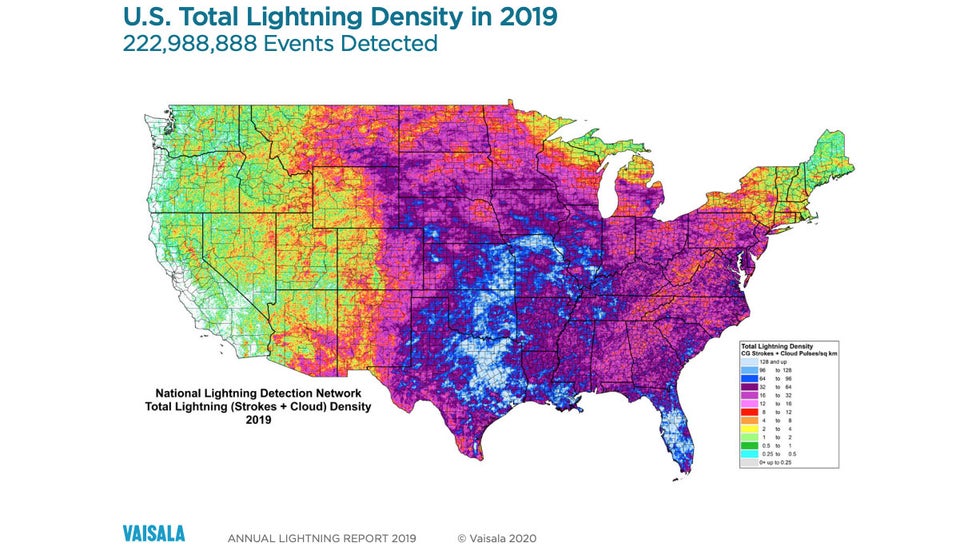Florida had fewer lightning strikes than normal in 2019, but still managed to retain its title as the lightning capital of the U.S., according to a new report released this week.
There were 2.35 billion lightning events worldwide in 2019, Finland-based Vaisala said in its 2019 Annual Lightning Report. This includes lightning strikes between clouds and the more dangerous cloud-to-ground strikes.
The U.S. accounted for about 9% of the worldwide total with nearly 223 million lightning detections.
Florida's total lightning was 7% below its average per year, but the state still had the highest number of lightning strikes per square mile for the U.S. Rounding out the top five most lightning-prone states in 2019 were: Oklahoma, Missouri, Texas and Louisiana.

“Although some of the traditional lightning hotspots like Florida had less lightning than normal, other states, such as Texas, had significantly more,” said Casey McCullar, Head of Lightning at Vaisala Digital in a press release.
The report noted that Texas, Missouri and Kansas all had 2 million more lightning detections than normal last year.
Lightning activity is more sparse to the west of the Rocky Mountains, but part of the region was unusually electric last year.
“Of note, the Pacific Northwest heard a lot of thunder last year – Washington and Oregon each had more lightning in 2019 than in any year since 2015,” McCullar said.
Cloud-to-ground lightning has killed an average of 27 people annually in the U.S. over the past 10 years, according to NOAA.
There were 20 lightning-related deaths in 2019. Texas and Florida had the most with three people killed in each state.
2019's Lightning Around the Globe
Lightning hot spots in the Western Hemisphere include areas from the Great Plains and Gulf Coast of the U.S. into Central America and northern and central parts of South America.
Tropical locations near and either side of the equator have the most lightning in the Eastern Hemisphere. This includes an area from central Africa to eastern India and much of southeast Asia. One particular spot that stands out is the Democratic Republic of the Congo in central Africa.
Vaisala noted that one lightning bolt was detected within 110 miles of the North Pole last year, setting a Guinness World Record for the most northerly lightning detected.

Most of the lightning in the world is detected over or near land areas. Since land areas heat up faster than water, there is a larger amount of unstable air available in order to form thunderstorms. The highest concentrations of lightning are in parts of the world where warm and humid air exists for a large amount of the year.
The Weather Company’s primary journalistic mission is to report on breaking weather news, the environment and the importance of science to our lives. This story does not necessarily represent the position of our parent company, IBM.
The Weather Company’s primary journalistic mission is to report on breaking weather news, the environment and the importance of science to our lives. This story does not necessarily represent the position of our parent company, IBM.

No comments:
Post a Comment